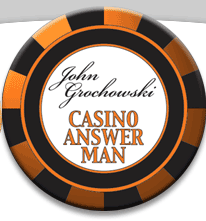Q. How is it that a casino can afford to pay you 800 coins for four Aces on some games, 2,000 on some others, but only 125 on Jacks or Better? On the games that pay more, are they programmed so the Aces come up less often?A. On the contrary. We hit four Aces more often, not less, on games such as Double Bonus Poker (800 coins for a five-coin bet), Double Double Bonus Poker (800 coins most of the time, but 2,000 if the four Aces are accompanied by a 2, 3 or 4) or Super Aces (2,000 coins) than we do on Jacks or Better (125 coins). That's because we adjust our playing strategy to account for the bigger payoffs on those Aces.
The prime example is a full house that includes three Aces. On Jacks or Better, we just take the full house payoff. On the other games mentioned, we hold the three Aces and discard the other pair, hoping for the fourth Ace.
So how can games such as Double Bonus, Double Double Bonus and Super Aces pay us so much more than Jacks or Better does on Ace quads? Because what they give you on four of a kind, they take away elsewhere on the pay table. One thing all those big Ace games have in common is that they pay only 1-for-1 on two pair, instead of the 2-for-1 you get on Jacks or Better. The drop in the two-pair payoff costs us about 12 percent of our return in the long run, giving game designers plenty of leeway to give us bigger bonuses elsewhere on the pay table.

No comments:
Post a Comment